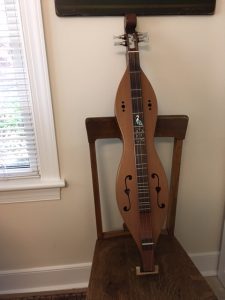
In high school I played percussion, but I never mastered a tuneful instrument–which I’ve always regretted. So, I recently started taking dulcimer lessons. The instrument and the music are rooted in Appalachia, as am I. In short, it’s important to me.
But so far, I’ve managed only one lesson and one practice per week– usually the morning of the lesson. This is not the road to proficiency!

I truly intend to practice, but there’s always something else to do first. Make the bed. Empty the dishwasher. Celebrate my birthday with my bridge buds.

Write my twice-weekly blogs. Submit a short story. Come up with and deliver a couple of tattoo stories to honor Amy Black. Spend Easter with my family in New England. And on and on.
AND THAT BRINGS ME TO FIRST THINGS VS. IMPORTANT THINGS.
It’s easy to fill your life with things that are right in front of you–or that have a date certain–and never get around to some things that are truly more important.

When my children were little I often lamented the clutter and mess in my house. (I was a psychology professor at the time.) One day a friend with four children just older than mine said, “If they aren’t doing structural damage, don’t worry about it.”
Which brings us to the point: LOOK AT HOW YOU SPEND YOUR TIME AND DECIDE WHICH FIRST THINGS CAN BE MOVED TO LAST. If writing is truly important to you, make time for it.
And so, off to practice dulcimer!
Interested in learning more about writing? Join me at Agile Writers for my class on Write Your Life: Memoir and Memoir-Based Fiction. For more information, visit the Agile Writers website.
Exciting news! I will be leading a class at Agile Writers, called Write Your Life: Memoir and Memoir-based Fiction. Anyone interested in writing about their life events is welcome to join. You can be any age, at any writing level; however, we will not be writing novels or poetry, so if those are your interests, try one of the other great classes Agile Writers has to offer!
The class will run for six weeks, April 23 to June 4, from 5-7 p.m. By the end of the six-week class, you can expect to have five short pieces ready to develop, one of which has been revised based on class critique. Each assignment will be crafted for this specific class. All members of the class will be expected to write for each class (up to 3 typewritten pages, double spaced) and to participate in the critiques. All assignments will be handed out the first day, so missing one class won’t put people off-track.
Date and time:
Sun, April 23, 2017 to Sun, June 4, 2017
5:00 PM – 7:00 PM
Location:
Agile Writers Offices
221 Ruthers Road #204
Richmond, VA 23235
Price: $180


Below are a few writing tips I’ve written about before that are definitely still applicable today. What writing tips have you received that have helped you the most?
Don’t have characters tell each other things they already know just because the reader doesn’t know those things. For example, if two sisters are talking, it’s highly unlikely that one would say, “When Mom and Dad adopted our brother John, I was devastated.” Find another way to convey relevant relationships or bits of backstory to the reader.
Another no-no is to have an exchange between two people weighed down by repeatedly calling each other by name. “Hello, John.” “Hi, Sharon.” “How are you doing, John?” “Oh, Sharon, I am so low I have to reach up to touch bottom.”
A third negative is putting in greetings and leave-takings that are pro-forma, tell us nothing about the characters, or don’t move the story forward. Just because they would happen in real life doesn’t mean that every amenity has to be spelled out to the point of diluting the scene.
The basic rule is that short, simple sentences–even sentence fragments–convey more energy than longer, more complex sentences. They are less likely to be beautiful in the poetic sense, but they carry more punch.
Take an emotion such as anger. If it is a long-held, smoldering anger, longer sentences with modifiers and clauses might be appropriate in a narrative passage. But if it is an anger outburst or a heated argument, you are more likely to want short sentences.
If you use lots of ands, buts, whens, and thens, consider if wordiness is sapping energy from your writing. Consider breaking one long sentence into two or more shorter ones.
Whether describing a person, a place, a thing, or a process, long detailed descriptions–unrelieved by action–are likely to be deadly. If very well done, readers will get so involved in the description, in visualizing exactly what the author had in mind, that they are taken out of the story itself. If not well done, those passages are likely to be skipped altogether. Elmore Leonard advises leaving out the parts that readers skip anyway. Replace length with strong, vivid, memorable language.
In describing people, go for details that will help define the character for the reader. For example, describing an employee saying, “Her dress was black and blue and ruffled, better suited to a ballroom than a boardroom,” would not create the same image in the mind’s eye of every reader but it’s likely to convey the same impression–which is generally much more important.
And consider not describing transportation at all. If you need to get your character from New York to Philadelphia, put her in a car, a plane, or a train, get her out again, and let it go–unless something important to the story happens in transit. Even then, skip as much of the before and after as possible.
Finally, leave out the parts of routine actions that the reader can assume. For example, if a man is going out and locks the door behind him, we know without being told that he had already opened the door and closed it again.